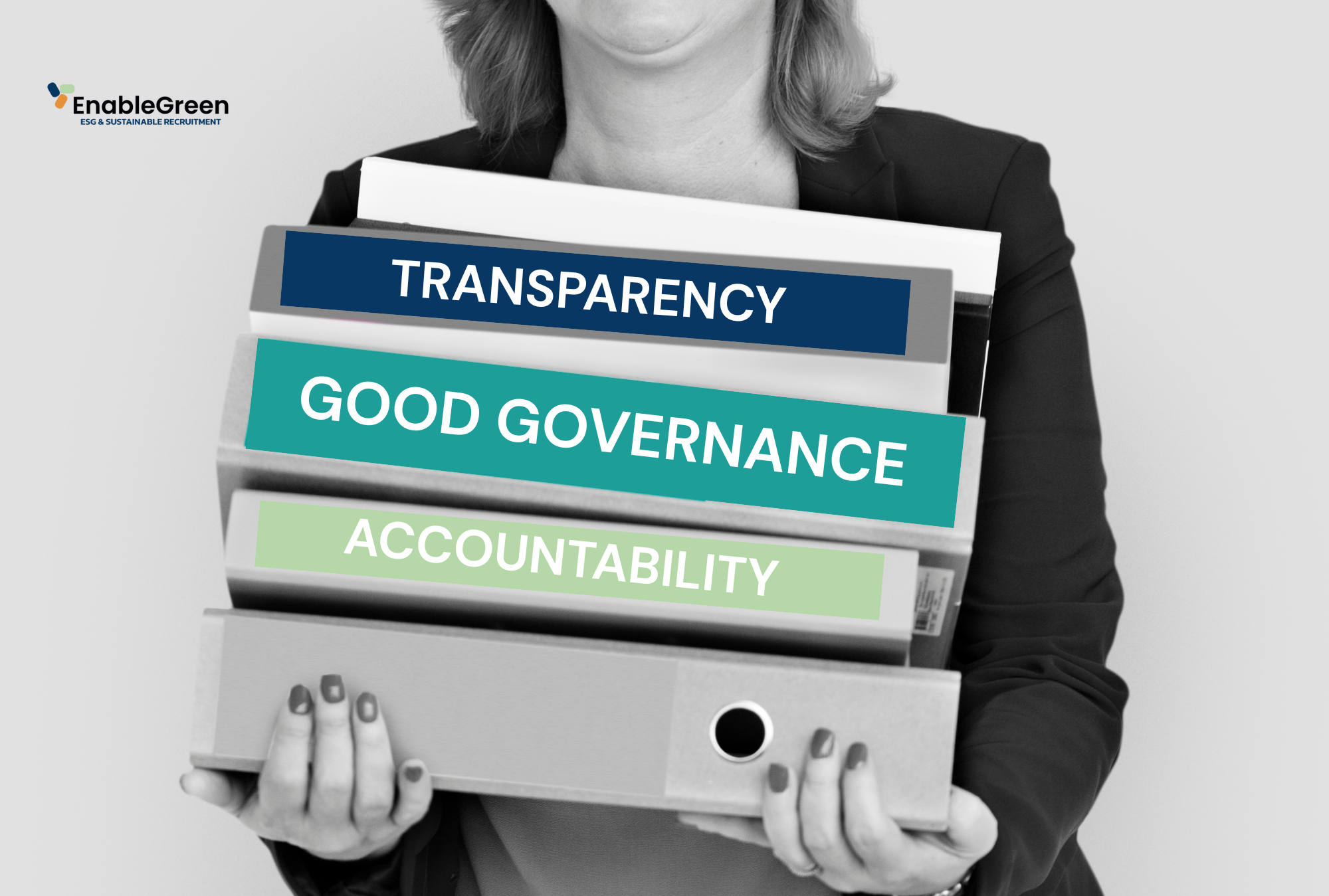Summary
Good and transparent governance is fundamental to the long-term success of businesses. It strengthens accountability, improves decision-making, reduces risks, and builds trust among investors, employees, customers, and regulators. Transparent practices also reinforce credibility, attract investment, and align organisations with sustainable growth. This article explores the importance of governance and provides practical measures for businesses to enhance it, including board effectiveness, disclosure practices, stakeholder engagement, and the use of technology.
What is corporate governance in business?
Business governance refers to the system of rules, practices, and processes that direct and control an organisation. It defines the distribution of responsibilities among the board of directors, management, shareholders, and other stakeholders. Governance frameworks establish how decisions are made, how performance is monitored, and how accountability is ensured.
Transparent corporate governance goes further by making these processes visible and understandable to all stakeholders. It creates clarity, builds confidence, and enables stakeholders to evaluate whether the organisation is acting responsibly and sustainably.
Importance of good governance for companies
How governance builds trust with stakeholders
Trust is a valuable asset. Stakeholders expect assurance that the business operates fairly and responsibly. Strong governance frameworks backed by transparent reporting demonstrate that management decisions are aligned with the organisation’s objectives and stakeholder interests.
According to David W. Duffy (CEO, Corporate Governance Institute) ‘Corporate governance is essential for preventing white-collar crimes and increasing investor trust ‘ — Highlighting the preventive and reputational value of solid governance structures.
Why governance matters for investors
Investors and lenders increasingly evaluate governance quality before committing capital. Weak governance structures raise concerns about mismanagement, fraud, or excessive risk-taking, which can lead to higher financing costs or reduced access to capital. Businesses with robust governance, by contrast, are more likely to secure funding on favourable terms.
Governance and risk management in companies
Sound governance frameworks establish clear controls, reporting mechanisms, and escalation processes. This reduces the likelihood of regulatory breaches, fraud, or reputational damage. Transparency in risk reporting enables companies to identify emerging threats and address them before they escalate.
Corporate governance and business reputation
Corporate reputation is closely linked to the way businesses are governed. Poor governance or lack of transparency can quickly undermine stakeholder confidence. In contrast, companies known for governance integrity are more attractive to talent, customers, and long-term investors.
Principles of accountability and oversight
Strong governance ensures that accountability is clearly defined and that oversight is effective at all levels of the organisation. This prevents conflicts of interest and strengthens organisational discipline.
“Boards have an obligation to review, understand, discuss and challenge a company’s strategy.” Larry Fink, (CEO, BlackRock) — Emphasising that governance isn’t passive but requires oversight and critical engagement.
The risks of weak governance
- Financial irregularities: Poor controls increase the risk of fraud and accounting scandals.
- Loss of investor confidence: Even minor reporting failures can erode trust and trigger investor withdrawal.
- Operational inefficiency: Without clear responsibilities, decision-making slows, and accountability is diluted.
- Reputational damage: Opaque practices foster suspicion among employees, regulators, and the public.
How to improve governance in an organisation
Steps to strengthen corporate boards
- Composition: Boards should include individuals with diverse expertise, perspectives, and independence to ensure balanced oversight.
- Committees: Establish audit, risk, and remuneration committees to provide focused supervision.
- Development: Directors should engage in continuous training to remain informed on governance standards and market expectations.
Best practices for transparent disclosure
- Accurate reporting: Financial and operational results should be presented clearly and regularly.
- Non-financial information: Disclosure of environmental, social, and governance (ESG) data is increasingly important to investors.
- Strategic communication: Transparency involves explaining the reasoning behind decisions, not only reporting outcomes.
Governance frameworks for long-term growth
Effective governance frameworks define roles and responsibilities clearly. Boards are accountable for oversight, management for execution, and shareholders for exercising their rights. This structure reduces duplication of effort and prevents accountability gaps, while supporting sustainable expansion.
Whistleblowing and ethical leadership in governance
- Tone at the top: Ethical behaviour must be modelled by senior leadership.
- Code of conduct: Formal guidelines, reinforced through training, set expectations for all employees.
- Whistleblowing channels: Secure and confidential reporting mechanisms encourage employees to raise concerns without fear.
Technology and governance: digital tools for boards
Digital solutions improve the efficiency and transparency of governance processes:
- Board portals allow secure sharing of documents and minutes.
- Compliance tools monitor regulatory obligations and automate reporting.
- Data dashboards provide real-time performance insights to management and boards.
Governance in ESG reporting
Good governance forms the “G” in ESG. It underpins environmental and social commitments by ensuring they are embedded into strategy, measured accurately, and reported transparently. Without governance, sustainability efforts often lack credibility and accountability. Increasingly, regulators and investors require governance systems that support robust ESG disclosure.
This connection between governance and sustainability also influences recruitment. Organisations need leaders and specialists who understand how governance frameworks interact with environmental and social goals. At EnableGreen, we specialise in ESG recruitment, helping companies secure the talent required to design, implement, and manage governance and sustainability strategies. Our network of sustainability and governance professionals supports businesses in building the right leadership capacity to meet stakeholder expectations and regulatory demands.
Case studies of good corporate governance
- Unilever: Known for integrating ESG into strategy and reporting, which has enhanced investor trust and brand resilience.
- Temasek Holdings (Singapore): A state-owned fund with governance structures that ensure professional independence and accountability while balancing public ownership.
- SMEs adopting governance early: Even smaller companies benefit from regular board meetings, documented decision-making, and transparent financial reporting, which strengthen their ability to attract partners and scale internationally.
Corporate governance roadmap for businesses
- Assess current practices and identify weaknesses in oversight, reporting, or risk management.
- Align leadership on the strategic value of governance and transparency.
- Set measurable objectives such as board independence targets or annual ESG reporting.
- Implement policies and tools to formalise codes of conduct, reporting systems, and stakeholder communication.
- Engage stakeholders by sharing progress and inviting feedback.
- Review regularly to ensure governance practices evolve with organisational growth and regulatory change.
Conclusion
Good and transparent governance is a foundation for sustainable business performance. It improves decision-making, reduces risks, attracts capital, and strengthens reputation. Companies that embed transparency into their governance frameworks gain the trust of investors, employees, regulators, and customers alike.
Improving governance is a continuous process: strengthening boards, clarifying responsibilities, enhancing disclosure, and promoting ethical leadership. Businesses that approach governance as a strategic priority will be better positioned to deliver long-term value and achieve sustainable growth.
Looking for ESG leaders to strengthen governance in your organisation?
At EnableGreen, we connect companies with senior executives and specialists in sustainability, ESG reporting, and governance. Our network spans international markets and provides access to high-calibre professionals who can drive your governance and ESG agenda forward.
👉 Contact us today to learn how our ESG recruitment services can help you secure the right talent for lasting impact.



